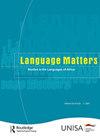Discourse Tactic(s) in Police-Suspect Interactions in Ibadan, Nigeria
IF 0.8
3区 文学
0 LANGUAGE & LINGUISTICS
引用次数: 0
Abstract
Abstract Existing studies on police interrogation have revealed that investigating police officers (IPOs) often resort to the use of physical force in extracting confessional statements from suspects. However, we maintain that IPOs do not usually subject suspects to torture in a bid to obtain a confession. We therefore examine how IPOs use tactics to achieve confessions in police-suspect interactions (PSIs). Data comprise nine interactions between IPOs and suspects tape-recorded at the Criminal Investigation and Intelligence Department, Ìyágankú, Ibadan, Oyo State, Nigeria. Drawing on Bateson’s framing theory, the study reveals that participants in PSIs resort to accentuation of crime, blaming of a third party, minimisation of crime, deployment of objections, use of alternative questions, avoidance of questions, oblique references, deliberate false statements, and resistance to achieve their respective goals. The study demonstrates that PSIs in Nigeria do not always involve the use of physical force by IPOs.尼日利亚伊巴丹警方嫌疑人互动中的话语策略
摘要现有的关于警察审讯的研究表明,调查警察在提取嫌疑人的供词时经常使用武力。然而,我们坚持认为,IPO通常不会为了获得供词而对嫌疑人施加酷刑。因此,我们研究了IPO如何在警方与嫌疑人的互动中使用策略来实现供词。数据包括在尼日利亚奥约州伊巴丹的刑事调查和情报部录制的IPO与嫌疑人之间的九次互动。根据Bateson的框架理论,该研究表明,PSIs的参与者为了实现各自的目标,会采取强调犯罪、指责第三方、尽量减少犯罪、提出反对意见、使用替代问题、回避问题、间接引用、故意虚假陈述和抵制的方式。该研究表明,尼日利亚的PSIs并不总是涉及IPO使用武力。
本文章由计算机程序翻译,如有差异,请以英文原文为准。
求助全文
约1分钟内获得全文
求助全文
来源期刊

Language Matters
Multiple-
CiteScore
1.20
自引率
0.00%
发文量
19
期刊介绍:
The purpose of Language Matters is to provide a journal of international standing with a unique African flavour focusing on multilingualism in Africa. Although the journal contributes to the language debate on all African languages, sub-Saharan Africa and issues related to multilingualism in the southern African context are the journal’s specific domains. The journal seeks to promote the dissemination of ideas, points of view, teaching strategies and research on different aspects of African languages, providing a forum for discussion on the whole spectrum of language usage and debate in Africa. The journal endorses a multidisciplinary approach to the study of language and welcomes contributions not only from sociolinguists, psycholinguists and the like, but also from educationalists, language practitioners, computer analysts, engineers or scholars with a genuine interest in and contribution to the study of language. All contributions are critically reviewed by at least two referees. Although the general focus remains on multilingualism and related issues, one of the three issues of Language Matters published each year is a special thematic edition on Language Politics in Africa. These special issues embrace a wide spectrum of language matters of current relevance in Southern Africa.
 求助内容:
求助内容: 应助结果提醒方式:
应助结果提醒方式:


